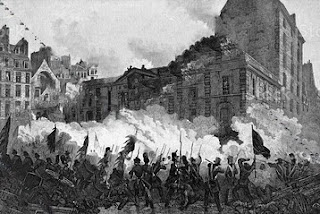-: Death of a Salesman Symbolism, Imagery, Allegory :-
 |
| Death of a Salesman |
A symbol is a particular image that represents something beyond itself. It could be an object, a concept, an idea, or a character in a literary text, but its full implication comes from outside the text, from the time and space in which the text is conceived or interpreted. Miller creates a sense of fusion in Death of A Salesman by surrounding Willy and his family with various symbols that denote his physical and emotional decomposition. Willy's prevalent focus on superficial aspects, such as equating a tennis court with the merits of people, and the size of an advertisement with the efficiency of a refrigerator which is a quite gross judgement by a non-technical person believing in the marketing gimmick of a manufacturer even after being himself a salesman, and the physical appearance of his own two sons with their ability to function productively in the business would show that he associates quality solely in terms of appearance. |
Willy's automobile- a symbol of his vitality and his masculinity because he functions as a "road man" - has changed from a Chevrolet to a decrepit Studebaker, paralleling Willy's own transformation from a young salesman in his early days as a working professional to an old man. The Lowmans' regenerator- the family's source of nourishment- continuously breaks down, draining the family for whom it is meant to provide. However, he simply idealises the superficial aspect of his machinery- the chevvy [sic] for its impressive physical appearance and the refrigerator for its striking and ubiquitous advertisements. Through these symbols, Miller both manifests Willy's own declining masculinity and emphasises the salesman's compulsive need to maintain his appearance of functionality.
Furthermore, Willy's house, a traditional symbolic representation of the owner, lays inform before the intimidatingly phallic apartments that dwarf the house's diminishing form. Just as he lies to Charley about having a job when he has, in fact, been fired from his previous company, Willy maintains the facade of domestic harmony by updating the appearance of the interior of his house to meet social standards. By installing the front stoop, Willy focuses on the superficial curb appeal. Instead of maintaining the condition of the interior of his house - or even the relationships of the inhabitants therein - Willy shows his obsession with exterior splendour. By repairing the celling, Willy reveals his profound need to "cover" himself: he backtracks with Linda about the true amount of his commission after his initial gross embellishment, he glosses over his son's thievery to hide their criminal actions, and he pushes Biff away to hide his affair. Additionally, Willy replaces the plumbing in his house, which he can not maintain without outside help, but also creates a phallic image i.e. Willy's own "pipes" do not work anymore referring to his own declining state of physical and emotional health.
Saccharine, not only elucidate Willy's failing body functions but also compensate for his defects. Willy's faulty eyesight and glasses represent his effort to compensate for his failings with times. Instead of changing his impaired vision of the intangible American Dream, he simply comforts the capitalistic society by procuring new glasses that will aid him in his flawed ideology. By relating Willy's procurement of new glasses with his vision to be a rich man may seem some gross representation of the individual but the point of concern here is that whatever happened in Willy's life, he may not change himself because he is obsessed with himself, about his family and his relation with each individual in the drama. Now he is also an old man, so he takes time to adopt anything which he never accepts.
Again, Willy's inability to remain successful in the masculine sphere perhaps stems from the fact that he never had a positive masculine role model in his life. Like his faulty vegetable garden, Willy can not produce successful heirs (his seeds). Happy, like his father, undergoes a crisis of self-awareness during the play. Paradoxically, Happy compensates for his lack of masculinity to function emotionally as a man by exerting his physical power over females in misogynistic and superficial relationships. Biff, like Happy, "inherits from his father an extremely fragile sense of self-worth" (Ribkoff), which cause him to disregard other members of his football team to score a touchdown in Willy's name, leading to the destruction of his own Lowman team - his family. He also remains in an adolescent state throughout the play, grasps at masculinity as represented by the fountain pen, a phallic symbol, when he goes to Bill Oliver to borrow money. Linda, on the other hand, enables her husband and sons to maintain the false bravado, leading to their destruction. Miller often shows Linda with a basket of laundry, who "washes out stains", metaphorically, the stain of Willy's defeats. Miller also transforms Willy from a flesh and blood human being into inanimate objects: an orange peel, a zero and, ultimately, the prospect of a check for twenty thousand dollars.
Throughout the play, Miller utilizes symbols to represent the decay of the Lowman family.




No comments
Thanks for your valuable opinion. Your comment inspires us a lot to do better time and again.